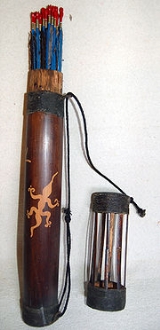
Quiver
WordNet
noun
(1) The act of vibrating
(2) Case for holding arrows
(3) An almost pleasurable sensation of fright
"A frisson of surprise shot through him"
(4) A shaky motion
"The shaking of his fingers as he lit his pipe"
verb
(5) Move back and forth very rapidly
"The candle flickered"
(6) Move with or as if with a regular alternating motion
"The city pulsated with music and excitement"
(7) Shake with fast, tremulous movements
"His nostrils palpitated"
WiktionaryText
Etymology 1
From via , from and , from West Germanic }, whence also Old English cocer, Old High German kohhar
Noun
- A container for arrows, crossbow bolts or darts, such as those fired from a bow, crossbow or blowgun.
- 1598, William Shakespeare, Much Ado about Nothing, Act I, Scene I, line 271:
- Don Pedro: Nay, if Cupid have not spent all his quiver in Venice, thou wilt quake for this shortly.
- 1786, Francis Grose, A Treatise on Ancient Armour and Weapons, page 39:
- Arrows were carried in quiver, called also an arrow case, which served for the magazine, arrows for immediate use were worn in the girdle.
- 1598, William Shakespeare, Much Ado about Nothing, Act I, Scene I, line 271:
- A ready storage location for figurative tools or weapons.
- He's got lots of sales pitches in his quiver.
- Shaking or moving with a slight trembling motion.
Adjective
- Nimble, active.
- 1598, William Shakespeare, Henry V, Part II, Act III, Scene II, line 281:
- there was a little quiver fellow, and 'a would manage you his piece thus; and 'a would about and about, and come you in and come you in.
- 1598, William Shakespeare, Henry V, Part II, Act III, Scene II, line 281:
Verb
- To shake or move with slight and tremulous motion; to tremble; to quake; to shudder; to shiver.
- 1593, William Shakespeare, Titus Andronicus, Act II, Scene III, line 12:
- The birds chaunt melody on every bush, The snake lies rolled in the cheerful sun, The green leaves quiver with the cooling wind And make a checker'd shadow on the ground.
- 1593, William Shakespeare, Titus Andronicus, Act II, Scene III, line 12:

